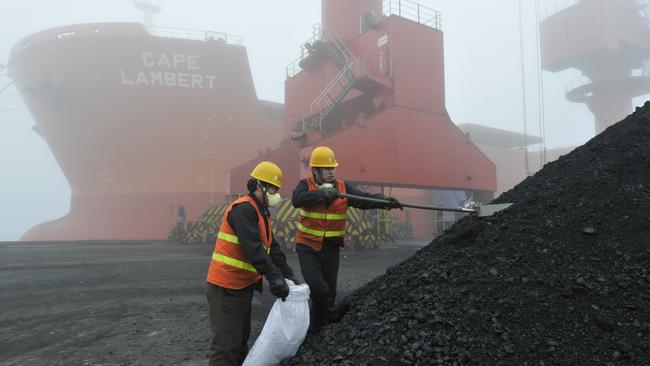China coal ban may stay for years, says Goldman Sachs
Valuable Queensland coal on 15 ships could remain stuck at sea for years as China’s ban appears to be hardening, experts say.

Fears are growing that Beijing’s ban on Australian coal may remain in place for several years with 15 ships carrying $440m of supplies from Queensland mines remaining stranded off the coast of China, a year after the trade stand-off first began.
Beijing in January instructed owners of the banned Australian coal to find new buyers outside of China, as Xi Jinping’s administration scuttled the $14bn export trade and ramped up pressure on the Morrison government.
Between five to seven vessels carrying Australian coal have been discharged each month but the supplies remain stored in bonded areas and have not been released through customs, sources said.
Fifteen vessels carrying the more valuable metallurgical coal – used for steelmaking – still remain stranded off the coast with 2.2 million tonnes of supplies having lost their value after being stuck offshore.
The boycott of one of Australia’s biggest export earners started a year ago and at one stage saw more than 70 vessels and 1500 sailors stranded offshore carrying more than $1bn of coal.
The ban on Australia could be in place for several years, according to Goldman Sachs, citing discussions it held with Queensland coal producers.
“The base case for most companies now is that the China import ban on Australian coal may last for years,” Goldman Sachs analyst Paul Young said.
The ban looks set to last for “much longer” than initially expected, consultancy WoodMackenzie added.
“Political tensions between China and Australia have worsened since an informal ban on Australian coal was implemented in October,” said WoodMac principal analyst Rory Simington.
“Hopes that stranded Australian cargoes might be allowed to clear customs appear dashed after Guangzhou customs authorities recently asked importers to reload and ship the cargoes out of China. It now appears the ban could remain in place for much longer than anticipated.”
The bulk vessels were swept up in China’s campaign of trade warfare against Australia with authorities overseeing a go-slow on Australian coal to support more expensive local producers.
Tensions escalated in April after Foreign Minister Marise Payne tore up Victoria’s Belt and Road agreements with China, with Beijing warning the “provocative” move could throw relations between the two countries “into the abyss”. The National Development and Reform Commission suspended economic talks with Australia earlier in May.
China has turned to rival producers to fill the gap.
“China is procuring from Indonesia, Russia and Colombia to replace Australian thermal coal. It has replaced met coal by taking a hit on coke quality and increasing imports from Russia, US, Canada and Mongolia, and by increasing domestic production,” Mr Young said.
The ban has forced Chinese coal users to pay over the odds to secure supply at $US111 a tonne compared with $US80 a tonne from Australian producers, WoodMac noted.
“One thing appears certain: Chinese consumers will be paying significantly more for coal than consumers elsewhere. Based on current prices and freight rates, a southern Chinese buyer would be paying $US111 a tonne for Russian 5500 quality or almost 50 per cent more than a theoretical $US75 a tonne for Australian material,” WoodMac said. “This price differential will probably soften as buyers and suppliers alike adjust. Nevertheless, the gap is still likely to be substantial.”
Speculation has been brewing that LNG has also started to be targeted by smaller Chinese buyers, a further setback from the trade spat which has also seen wine, barley, beef, wheat, lobsters and cotton all targeted in the last year.



To join the conversation, please log in. Don't have an account? Register
Join the conversation, you are commenting as Logout